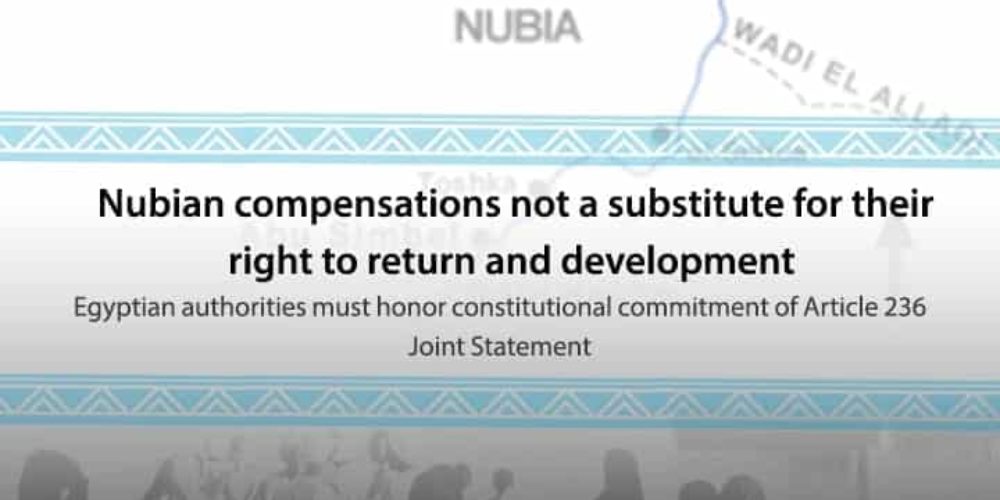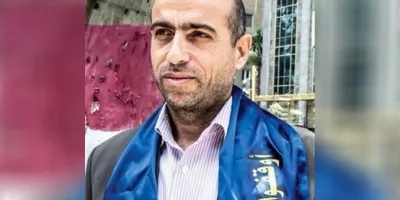Egyptian authorities must honor constitutional commitment of Article 236
The undersigned human rights organizations call upon Egyptian authorities to respect their constitutional obligations under article 236, as well as their obligations under international law, standards set forth in Convention No. 107 of 1957 for the Protection of Indigenous and Tribal Peoples, and Convention No. 169 concerning Indigenous and Tribal Peoples in Independent Countries, Issued in 2007, all of which require that Nubians be able to return to their original lands and enjoy their development during the 10 year period specified by the Constitution, half of which have already passed. The article has also stipulated that such rights are not to be circumvented through various compensation mechanisms. The Nubians’ compensation by alternative housing, money or land is not a substitute for the right to settle, which is not only a constitutional obligation, but an integral part of the Nubians’ heritage and the fruit of their struggle for years to extract recognition of their rights, suffering and displacement.
Despite the constitutional recognition of the right of Nubians to return to their original lands and development, the Egyptian authorities pursued a series of policies and decisions that radically undermine these rights, starting with Presidential Decree No. 444 of 2014, which considered the lands of 16 Nubian villages as military border territories where civilians can neither live nor make use of, presidential decrees Nos. 355 and 498 of 2016, which ratified the expropriation of many Nubian lands in favor of the one and a half million acre project, as well as Law No. 157 of 2018 on the establishment of the Upper Egypt Development Authority, which ignored the hopes of Nubians after it lacked any mention of their migration or right to return, prompting Yassin Abdul Saboor, MP for Nasr Nuba Circuit in Aswan to describe the law as unconstitutional, and that it represents a usurpation of the rights of the Nuba people to be resettled along the shores of Lake Nasser.
On June 20, 2019, in a press conference following the meeting of the Council of Ministers, Minister Omar Marwan, Minister of Parliament Affairs and Chairman of the National Committee for the Development of Rules and Operational Regulations for Disbursement of Nuba Reparations, said that during the meeting it was agreed to undertake procedures for paying compensation to the Nubians who have been affected by the expansion of the Aswan dam and the building of the High Dam and who have not been compensated, and that compensation will proceed in accordance with the directives of President Abdul Fattah al-Sisi to the government to solve the problem of the people of Nuba, the Prime Minister’s decisions No. 478 of 2017 on the formation of a committee headed by the Ministry of Justice to identify the names of those affected and were never compensated, and the Prime Minister’s decision No. 371 of 2019 on the formation of a committee to establish rules and operational mechanisms for the disbursement of compensation to beneficiaries, headed by the minister of the House of Representatives, and that the Committee has approved the eligible names identified by the Ministry of Justice, and that necessary regulations have been agreed to disburse compensations.
The forms of compensation offered varied so that compensation for those affected by the construction and upgrading of the Aswan reservoir would be compensated in kind, through the ownership of the land on which they had already built or the right to use it. Those affected by the construction of the High Dam will be compensated as follows: owners of agricultural land will be compensated with other lands either in the Khour Qandi area (6000 acres) or the Wadi Amal area (1200 acres). Those entitled to housing, the owner of one dwelling will be compensated by another dwelling inside or outside Aswan governorate within a number of housing units available in some governorates. The person concerned can request to receive monetary compensation instead of housing or agricultural land. The monetary compensation will be 225 thousand pounds for a house and 25,000 pounds for an acre.
Despite all those decrees issued by the state, although appearing to be an attempt to solve Nuba problems in accordance with presidential directives, in reality they are an attempt or circumvention of the right to return and resettlement and development. The spread of Nubians over geographical areas scattered over 6 governorates accentuates the effect of displacement on the cultural cohesion of Nubians and help dilute and eventually erase Nubian identity, culture and language.
The decree also constitutes a violation of article 236 of the constitution which clearly stated that “The state works on developing and implementing projects to bring back the residents of Nubia to their original areas and develop them within 10 years in the manner organized by law” this constitutional article represents the first acknowledgement by the Egyptian state that Nubians are the original population of the area south to the High Dam. The article also clearly acknowledged the right of Nubians to return to their land and its development. This is a collective right that differs from individual remuneration, contesting any subsequent procedures that acknowledge only the individual character of that right or encroaches thereupon. The citizens of Nuba are entitled to collective rights to return and to development and are their problems are not individual ones that call for individual remuneration. They are victims of state policies.
In addition to the unconstitutionality of compensation decisions, the compensation procedures offered by the government lacked a structured legal framework. Historically, Law No. 6 of 1933 concerning the expropriation of property required by the second expansion of the Aswan reservoir, an exceptional addendum of expropriation law No. 5 of 1907, estimated the Nubians’ compensation in order to cope with the disasters that will result from the construction and expansion of the reservoir. Law No. 67 of 1962 on the expropriation of the Nuba lands, which were flooded by the High Dam, also regulated compensations for Nubians affected by the construction of the High Dam, in addition to the decisions of the Minister of Social Affairs at the time, in decree No. 106 of 1962 on the statement of the rules of compensation and establishing ownership of Nubians, decree 106 of 1963 concerning the housing of Nuba resident families in the new villages, and finally the decision of the Minister of Social Affairs No. 135 of 1980 repealing Ministerial decree No. 160 of 1962, which since its repeal and the adoption of Law No. 10 of 1990 on expropriation, no other legislation was passed regulating how Nubians are to access their rights. Consequently, the decisions of the Council of Ministers No. 478 of 2017 and No. 371 of 2019 lack a legal framework within which to operate. In the absence of such a framework, the Nubians will not be able to challenge the State’s assessment of the value of compensation, as guaranteed by the aforementioned expropriation laws.
The decision to remunerate the Nubian has converted rights provided for constitutionally into a state donation or charity, which Nubians can either accept or refuse. Furthermore, they have been completely excluded from any societal dialogues or discussions on the resolution, which also did not mention any mechanism to challenge the Committees’ assessment of compensation or its value, leaving Nubians only with the right to appeal before the Committee, and not the judiciary, the names of those identified for compensation or its form, which, of course, does not include the option of return to the original lands.
The Egyptian authorities ignored the alternative legal framework to enable Nubians their rights of return and development through the law of the establishment of the High Commission for the Development and Reconstruction of the Old Nuba land, which was the result of the adoption of the 2014 Constitution. The Minister of Transitional Justice and Parliamentary Affairs, Ibrahim Al-Heneidi, at the time formed the Committee for the Development of Nuba and Aswan, mandated with the enforcement of article 236 of the constitution and setting a legal framework for the regulation of the right to return and development. It described Nubians and their descendants as displaced people because of the Aswan reservoir in 1902, 1912, and 1933 and the construction of the High Dam between 1960 and 1964. The committee met with Nubian citizens and representatives of Nubian groups in Aswan, Cairo and various governorates in addition to Nuba representatives abroad, listened to their demands concerning their return to their original lands and their proposals for development along the shores of Lake Nasser. Then, an 18-member subcommittee drafted a law that outlines the mandate of the committee, its responsibility to supervise the return of Nubians to their villages as well as the use of land. The committee announced that the law was ready for the formation of the high authority for the development of the old Nuba lands, in preparation for its presentation to parliament for approval. However, the draft was not sent to parliament. No reasons were given, while press reports mentioned that representatives of sovereign bodies have expressed their refusal of the draft for national security reasons.
It is therefore that the undersigned organizations call upon Egyptian authorities:
- Egyptian Parliament to honor the constitutional obligation provided for in article 236 and promptly endorse the promulgation of the law establishing the High Commission for the Resettlement, Reconstruction and Development of the original Nuba territories.
- The Prime Minister to repeal Resolutions No. 478 of 2017 concerning the formation of a committee headed by the Ministry of Justice to identify the names of those affected Nubians who have not been compensated, and Decision No. 371 of 2019 on the formation of a committee to establish rules and executive regulations for the payment of compensation to the beneficiaries, and replace them with the decrees regulating the resettlement of Nubians and the development of their region according to the law establishing the High Commission for the Resettlement, Reconstruction and Development of the original Nuba territories.
- The President of Egypt to repeal the Republican Decree No. 444 of 2014 assigning the land of 16 Nubian villages as military border land, and Resolutions Nos. 355 and 498 of 2016, which certify the confiscation of many Nubian lands for the one and a half million acres’ project.
- Egyptian Parliament to amend the law establishing the Upper Egypt Development Authority No. 157 of 2018 to comply with the Egyptian constitution, in particular Article 236, in order to meet the right of the Nubians to return to their lands as well as engage in participatory development
Undersigned organizations:
- Adalah Center for Rights and Freedoms (Adalah)
- Border Center for Support and Consulting (BSC)
- The Freedom Initiative
- El-Nadeem Center
- Cairo Institute for Human Rights Studies (CIHRS)
- Egyptian Center for Economic and Social Rights (ECESR)
- Egyptian Front for Human Rights (EFHR)
- Committee for Justice (CFJ)
- Arab Foundation for Civil and Political Rights-Nedal (Nedal)
- Humena for Human Rights and Civic Engagement (Humena)
- Belady Center for Rights and Freedoms
- Association of Freedom of Thought and Expression (AFTE)
- Arab Network for Human Rights Information (ANHRI)






